Leading up to its 30th Annual Worldwide Developers Conference, Apple is channeling its unique hardware savvy to create a future that is powerful, premium, accessible to everyone, and private to yourself. And it's doing it alone, competing largely against much cheaper copies of its own work that are supported by surveillance advertising. Here's why that matters.
The only premium
Apple didn't create a monopoly in Park Place-priced hardware. It's just been a game that everyone else failed at. Microsoft blew billions at rivaling iOS with Windows Mobile, Band, and Surface. Blackberry incinerated IP in an effort to remain relevant in phones. Samsung ineffectually threw all its weight into producing high-end hardware and buffoonishly managed to screw up every moment of spotlight it was given, from VR face gear catching fire to a Galaxy Fold display that self-destructed within two days. After all that, Samsung is has resettled as just a components vendor, not the leader in charting out the future of consumer tech.
Google frittered away billions of dollars in various vanity projects from netbooks to tablets to wearables to well, phones, before admitting that its entire last decade of hardware strategy was a throwaway effort and that its true calling was just to spy on poor people and monetize their behaviors like a creepy global government. Papers, please! If you don't provide your login credentials you can only access a basic version of the map.
Today Google is claiming that it's concerned about 'privacy only being only an [Apple] luxury good,' which is funny both because it's Google talking about privacy and also because its own products were priced just as luxuriously high as Apple's, it just couldn't sell the Chromebook Pixel, Pixel C, and Pixel 1-3 and so on.
It's easy to poke fun at all the arrogant incompetent billionaires who blew out all their stupid ideas with the bravado of a teenage boy, but then couldn't deliver. But consider: is Apple's singularly successful ability to sell us high-end iPhones, to convince us to join the wearable world of Apple Watch and AirPods, and to chart the future of both notebooks and tablets— simultaneously and in parallel— a good thing for us, and for technology?
Who is serving you?
One tech company has never dominated so many industries as Apple currently does. Microsoft once exerted monopolistic control over PCs, but it didn't also control telephones, music, and watches, despite efforts to do so. Apple does. It's not a monopoly however: there are now more options than ever in notebook OS. There is no limit on access to music or films, and in fact, there have never been so many options in free or paid or subscribed content, on more potential platforms. There are all sorts of phone options and more watches than anyone cares about.
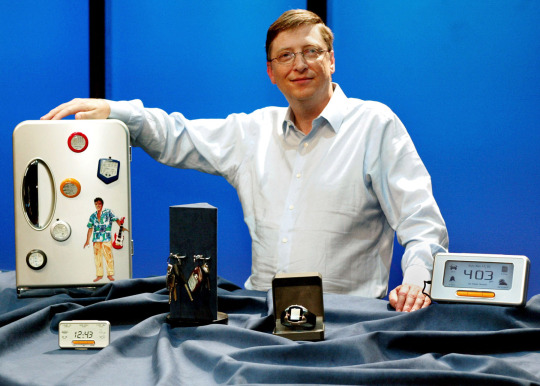 16 years ago, Bill Gates tried to move into selling watches and mobile displays but couldn't. Microsoft still can't, even as Apple does.
16 years ago, Bill Gates tried to move into selling watches and mobile displays but couldn't. Microsoft still can't, even as Apple does.Apple is today's Sony, Atari, Microsoft, Intel, and Palm— all in one. Apple has no real viable competition in hardware. And that matters because hardware is the only real business model competing against thin-client surveillance advertising. If you are an Android phone, a Tizen TV or a Windows PC, you're so unprofitable that you require an adware bailout. Not so if you're a Mac or an iPhone.
If you go to the party and you don't pay to get in, and you don't pay for drinks, maybe you're the attraction. I love getting into parties for free and not having to pay for my drinks, but when it becomes clear that I'm there because I'm expected to perform, I feel a lot like the people who realize that the free website they're loading is really loading them, and everything they've done, recorded in a trail of tracking cookies.
There's something liberating about thinking that you pay for your own drinks, and are not just slamming down whatever the person next to you is handing you, for free. That liberty is now becoming a luxury, as "drinks" on the internet are increasingly laced with tracking and sophisticated surveillance features designed to pin down how to best exploit you in an advertising negotiation. Sure feels good to retire into your own premium cabin rather than sit thirsty at the bar waiting to be handed your next "free drink" by leering creeps who are not there to serve you a product; they're there to serve you as the product.
A singular, critical mass of competence
It's therefore remarkable that in such an era of unbridled, vibrant competition, everyone outside of Apple is just dogging it. Apple has mastered the ability to sell hardware. And at incredible scale. Apple builds over 215 million iPhones annually, and services an installed base of over 100 million Macs and well over 300 million iPads.
And it's impressive that Apple is not just selling vast unit numbers of hardware, but is also selling hardware at average prices many times higher than any of its competitors. When IDC and other research groups rattle off their statistics that Apple is behind Samsung and Huawei in unit shipments, the real story is that Apple is somehow bringing in more revenues than both combined, simply by virtue of the fact that iPhones aren't a cheap commodity.
The first question is a bewildering "how is that even possible," and the second swings in a punch with "is that even a good thing, now and in the future?" What happens as the technology platform shifts from x86 PCs and ARM-powered commodity phones to notebooks, tablets, mobiles and, increasingly, wearables where Apple alone has a vast lead in silicon, in OS, in platforms and development tools, and has the only business model that's capable of advancing technology commercially without shaking you down for ads?
Those concerns are raised by Apple's sheer competence in orchestrating most of the Western world's electronics used in daily interactions. Apple now has a solid lead over Android in real-world use in the U.S. and in Japan. And with the world's number two Android licensee getting kicked in the teeth the way Huawei has been, Europe is poised to become fractionalized in the manner of China, where two versions of a standard exist, connected to different services and app stores.
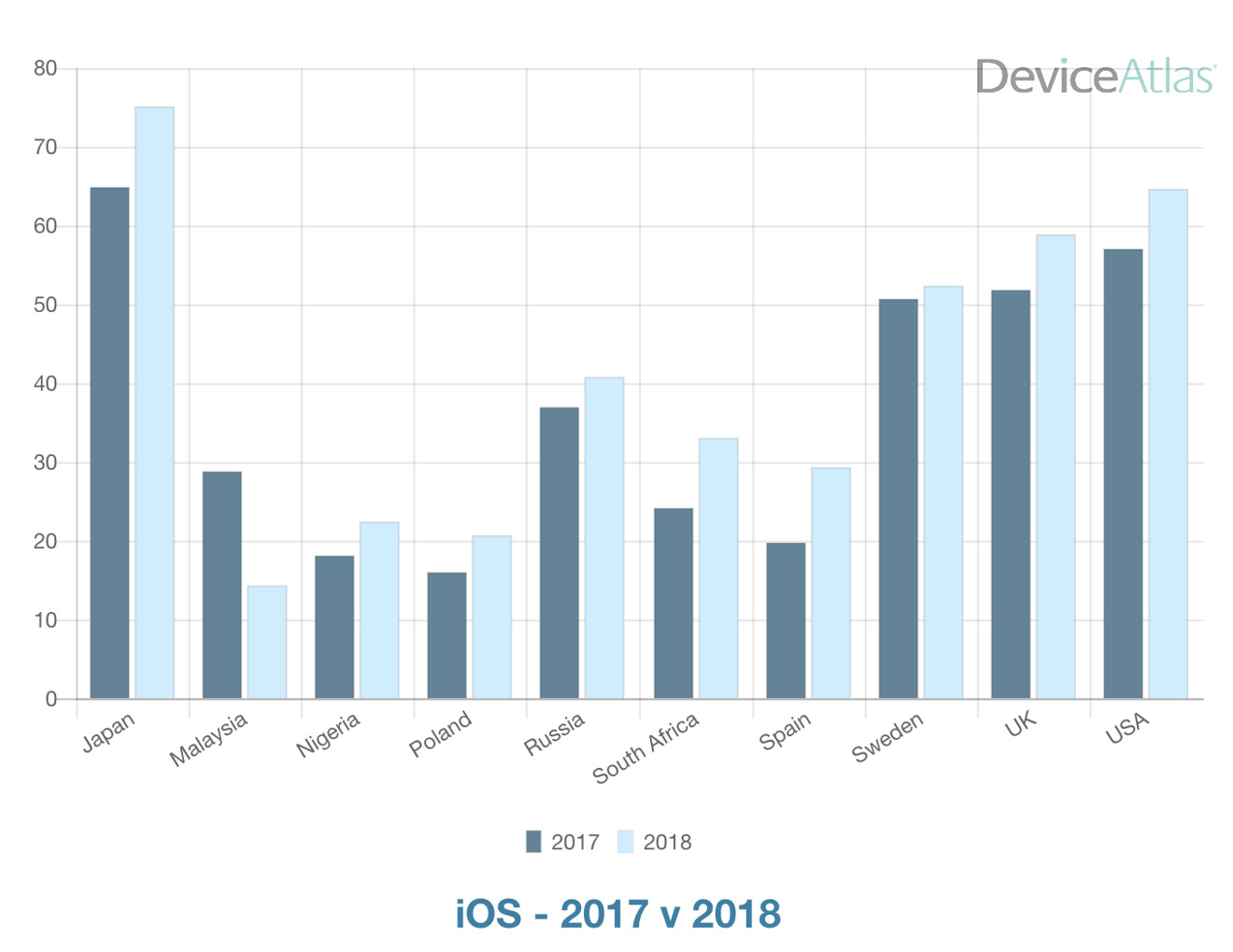 Japan's percentage of mobile users on iOS is higher than even in Apple's home country. Source: Device Atlas
Japan's percentage of mobile users on iOS is higher than even in Apple's home country. Source: Device AtlasFor making phone calls and playing Angry Birds, the various forks of Android are all minimally acceptable. But when it comes to the future of interconnected wearables, voice and AI intelligence, computational photography, augmented reality, and virtual reality, hardware performance and tight vertical integration from the silicon on up is incredibly important.
There's a reason why Google has blown hundreds of millions of dollars creating custom silicon for its Pixel devices. If the leader in search and cloud services is pursuing local hardware processing capacity, you can bet that Google knows after three years of Pixel flops that it's screwed. Two billion cheap Android handsets haven't accomplished squat, and they sure haven't positioned Google in a leadership role in consumer or enterprise mobile tech, even if Android Enthusiasts are still high-fiving themselves over "winning."
Across those same three years, Apple has progressed from A10 Fusion to A12 Bionic. From Intel's Core i7 to T2 and you-know-what's next. From W1 to W2 to W3 and H1. And while the tech media was in a frenzy about "5G" and what it might do for future subscribers two years from now, Apple is selling the today, now. Over the last three years of pundits worrying about the "end of iPhones" Apple sold $216, $229, and $266 billion worth of, mostly, hardware. That's more than the rest of the world produced in PCs, phones, tablets, and TVs combined.
Whether there's a problem with such a concentration of competency is a matter of debate. Should Apple's ability to control what software is distributed across its base of users be regulated by a third party government agency to prevent it from being "too good" at solving modern problems, even when there is currently the appearance of competition on other platforms? That's something to consider, but let's look at what Apple is doing with its concentration of intellectual power.
The benevolent Corporation
In most science fiction, if there's a company with tentacles in everything, it's usually a bad thing. Cyberdyne Systems unleashed the The Terminator. The Umbrella Corporation launched Resident Evil. And in Bladerunner, the Tyrell Corporation inadvertently created rogue androids that didn't like updates or surveillance tracking and had to be retired.
All these bleak visions of what a company in control of the future of technology might do don't really capture the current reality of what Apple is doing today. The closest futurism vision of "an Apple" might be the portrayal, in Bladerunner, of a future Atari, which exists in the movie only as a common billboard brand next to PanAm airlines, RCA, and Steve Jobs' brand muse: Cuisinart.
 Rather than an evil corporation, Apple is just the Atari that Bladerunner anticipated for 2019: a premium brand
Rather than an evil corporation, Apple is just the Atari that Bladerunner anticipated for 2019: a premium brandIn the future that Bladerunner imagined for 2019, Atari was still clearly the same thing it was in 1982: a company making video games. The idea that Atari would have survived rather than Apple is amusing, but the idea of a big American electronics maker being a major brand in the future isn't presented as alarming. It's expected. There are premium brands everywhere, including Cuisinart, which still sits next to cheaper kitchen appliances in department stores.
It's really more alarming that nobody else in the West is capable of competing at Apple's level. Microsoft has transitioned from being a fierce rival to being an iOS developer. Google is simmering down from its rather arrogant role as the company that was going to lead mobile platforms to be just another ad network focused on iOS, next to Facebook, Twitter, and a distantly-behind Yahoo. Samsung, LG, HTC, and Sony are all just commodity hardware players fighting with Chinese makers to shovel out me-too shipment volumes. None are leading any significant new current in technology.
So what is Apple doing that's different? Over the last decades of WWDC, the company had charted out a course of incremental technological advancement and actually delivered real, marketable advances. This year, Apple is showing off a new macOS 15, iOS 13 and no doubt a new watchOS and tvOS. But beyond new apps and Dark Mode, is there any evidence that Apple really advancing anything in the interest of consumers?
Yes.
WWDC19: Real world AI and computational photography
Apple is furiously kicking out new silicon, from MacBook coprocessors to wireless chips and SoCs that incorporate advanced Graphics, Neural Engine, and Image Signal Processing. But most of what we know about these hardware engines comes from documentation for third-party developers. Apple's work in Artificial Intelligence was assumed to be behind Google's, but Apple has vastly more installed clients handling real-world voice requests, including Apple Watch, HomePod, CarPlay and AirPods. Apple has the world's affluent consumers. Virtually all of them.
And while Google has shown off impressive computational photography features including extremely low light capture and the still yet to be delivered promise of erasing fences from photographs from a couple of years ago, its Pixel technology has deployed on only around 10 million devices across three years, most of which were at clearance sales. Over that period, Apple has shipped over a half billion iPhones with depth sensing Portrait, Portrait Lighting, advanced video capture and even a Time Lapse feature that blurs away distractions as if they were a fence in a Google demonstration, but for real.
The other difference is that Apple's computational photography is designed to enable hardware buyers to take nice photos. Google's Pixel camera feature is a worm intended to hook users it can then monetize. Would you rather be offered advanced new hardware at a regular clip, or rather just be offered to advertisers as a product, in exchange for a camera feature?
Across the last few years at WWDC, Apple has laid out an evolving set of tools to enable capture of not just images and video, but depth, supporting the addition of augmented reality layers. When Apple debuted Portrait on iPhone 7 four years ago, it depicted it as striving to work like a full-sized camera capable of capturing a specific depth of field, with a blurred background and foreground.
When Google showed off its own take on Portrait, it was merely trying to be like an iPhone 7. But what Google failed to deliver was a real platform for depth development by third parties. There's no way to insert or edit a layer of a Pixel Portrait. It's just a composition created by Google's fancy silicon. Modern iPhones capture both an image and depth data that can be used by third-party developers to do all sorts of interesting things, from beautifying your selfies to capturing and editing creative scenes that focus attention exactly where you want. Apple created a platform; Google copied a feature. On iPhone X and later models, the TrueDepth structure sensor camera enables third parties to do facial tracking and Augmented Reality selfies.
And beyond that, Apple's platform has hundreds of millions of users capturing depth images. Google has barely a few million handsets that can take a "good" image, as the Verge has tried so desperately, and vainly, to sell to its readers. Google's 2019 Pixel technology is great, but it is literally rotting on the shelf. Google's CEO can "you know" keep hand waving for a while about how it's only, you know, a matter of time before Pixel sales grow beyond an incredibly expensive vanity hobby level. But that's the kind of bullshit that Microsoft flapped about with Zune, and nobody is using a Zune today. And Microsoft isn't even in the music business anymore.
This year, expect to see more from Apple in the area of computational photography, particularly as a platform. I'd expect to see Apple doing more to support alternative types of optical lenses, beyond the standard and 2X zoom it currently uses to capture depth, portrait, and different types of stitched panoramas. Upcoming iPhones are expected to get a new wide angle lens, which could be valuable beyond the simple optical advantages in capturing a shot. Apple may also do more to enable existing lenses to extend capture potential using motion. Already, you can use panorama modes to create the digital effect of a wide angle lens, capturing a wider field into a single capture, for example, to fit a tall building into a shot.
Virtually all of the features of ARKit are effectively based on Visual Inertial Odometry, synchronizing device movement with the camera. As ARKit evolves, it's taking us in the direction of immersive AR displays— windshields and glasses, rather than just mobile displays.
And of course, AirPods already deliver, effectively, an immersive audio world augmented on top of our hearing. The more I use HomePod, the same I feel about it. The fact that it listens to your Siri requests for playback and then blasts out rich soundscape to listen to makes it feel like a natural part of the environment.
It's becoming clear that the future of wearable devices will give us "bicycle of the mind" powers over our hearing and vision, augmenting what we sense with external data that provides us with more information for decision making, and more richly enjoyable entertainment. I personally can't wait for glasses that can see what I'm looking at and focus on that for me, from the microscopic to the binocular.
Would you trust any ad-based company with delivering high suggestive information directly overlaying your vision and hearing, tracking what you look at and for how long? That would be foolish. Fortunately, the only company that's not pursuing an advertising angle on its hardware is also the only one that is already delivering sophisticated wearables and uniquely positioned to develop the technology for powering the wearables of the future.
Siri and services disruption
Much to do has been made about how voice first assistants would replace apps as the new interface to computing. That forecast was flatly wrong. While there are a few useful, common features that are easier to invoke with voice than using a touch UI, apps aren't going anywhere and we are not moving to a voice-only world of ambient computing any time soon.
On the other hand, as I uniquely predicted last year, Apple increased the functionality of Siri by enabling it to launch more common Shortcut tasks, customizable to the user and the apps they use. Rather than spending massively to increase the sophistication of Siri's capacity to parse complex speech in conversational formats, Apple disrupted the entire concept of voice by focusing on the real value and not on the idea that people had any commercial interest in chatting with tech devices beyond a passing fad of tech curiosity.
Amazon, Google, and Microsoft have all plowed tons of money into voice assistants that are not selling anything. Nobody is waving money for the solution to the made-up demo-imagined conundrum of wanting to order a curry from a moderately priced restaurant that's highly ranked for vegetarian options, and does it have a table for two at six, no five?
That's not how it works. That's not how any of this works.
This year, expect Apple to build more intelligence into iOS in practical ways that actually make real-world sense. And developers will get more insight into how to build Siri workflows into their apps so that users can trigger common commands verbally. Because that makes sense.
Cloud, Continuity, and TV
Parallel to Siri, Apple continues to work to advance its iCloud services that enhance the experience of its hardware. The ability to create cross-platform Apple Arcade titles will appear to lean on iCloud to keep gameplay synched as users move from their phone to Apple TV or to a Mac. Apple's Continuity features also continue to expand, last year getting iOS camera integration on the Mac. Other features, including the shared clipboard, also continue to get better. We hope to hear more next week.
Apple is set to introduce potentially a new Mac Pro, and also likely new displays. Imagine if it began integrating an Apple TV into its new displays, so that while not being used as a monitor, you could also use it as a TV+ screen, or to play Apple Arcade titles.
That's also the most reasonable way for Apple to get its toe in the waters in selling televisions, beyond the tablet devices it already sells. Apple already knows that the enterprise is interested in Apple TV as a presentation and signage tool with the ability to load custom apps and be remotely managed. If it began selling displays that integrated Apple TV's slim client, "across the room" screen technology, tvOS could dramatically move beyond the living room. I can't believe why Apple isn't already doing this.
New Apps
Apple has been ditching the "i" for a while now. No more iPhoto or iMessage; there's no iDrive and it's just Apple Music and Apple TV+. The remaining holdout is, of course, iTunes. It looks like that's on the way out, splitting up the very un-Apple-like monolithic media app into Podcasts, TV, and Music the same way Apple has Reminders, Notes, Calendar and Emails separate rather than being part of a big box of Outlook.
And it looks like some of the technology Apple is using to remodularize apps on the Mac is coming from UIKit, apps designed for iOS. This may also be the mechanism Apple is using to deliver Apple Arcade titles cross-platform. By making it easier for iOS app developers to bring their work to the Mac, Apple is further popularizing the idea of native apps as opposed to web-based software.
For years, pundits crowed that the world "should" move to web-based interfaces because they are cross-platform and run everywhere. But like Java, the reality is that web apps run like crap everywhere and require lots of repetitive testing to work anywhere well, for a short period of time before the standards change and a new engine emerges. Apple has continued to work on Safari, but has focused its efforts on mobile apps. Google and Microsoft were caught flat-footed.
Android finally caught up with the idea of local apps, but it was third party developers who made it clear that native apps were the preferred route in technology. The world's most popular consumer app, Facebook, now has a quite advanced mobile app but its website is total crap. The web overall has become a festering pool of surveillance tracking and advertising that's now almost unusable.
Apple can offer to do a couple of things: on the browser side, it can shape— for hundreds of millions of users— how their devices can be interacted with. Expect new technology limiting how third parties can track user behavior across sites. But more importantly, Apple has already demonstrated that it's possible to support ad-click referrals without tracking the user across every site they visit. Instead, Apple developed an API to track only which ad referred a sale, and not scrape up mountains of potentially private behavioral data while strip mining for ad dollars.
On the app side, Apple was once harshly criticized for its Walled Garden in mobile apps. Today it's clear that Apple's technical direction was sound. Apps need a store, and having a safe, regulated marketplace is better for developers and for users. Yet despite Apple's rules, it's clear that developers are still working to exploit users, suck up their data, and track them.
It's possible Apple will introduce new platform controls over apps, enabling users to impose firewall-like restrictions that block any activity, or strictly regulate and disclose what apps are doing in the background once they have access to your data. And rather than giving apps broad access to all your photos, contacts, calendar and other data sources, the OS could impose new restrictions that only allow apps to access sensitive data via an OS picker, where the platform returns a single data point rather than granting raw access to all your data, when all you want to do is share a specific photo or contact.
One thing that's remarkable in its failure to change much over the last decade is the concept of Contacts. Complex relationships, hierarchies, batches of photos assigned to an individual, preferred contact numbers that change with context like date and time of day, and many other features could be rolled into a sophisticated CRM-like database of contacts that the system uses to make intelligent suggestions. Sets of map locations for where you might meet a group of clients. A history of linked calendar event interactions.
The future of tech will enable a lot of smart connections like this, but these also require a lot more layers of security keeping third parties from mining your records looking for ways to exploit you with advertising. Apple has a powerful position as the maker of hardware and the software platform that enforces your preferences and restrictions and looks out for your privacy.
Journalists fed stories by developers have created a narrative that Apple is limiting what developers can do, but that has been proven false. And it's now very clear that nobody should trust developers to respect their data.
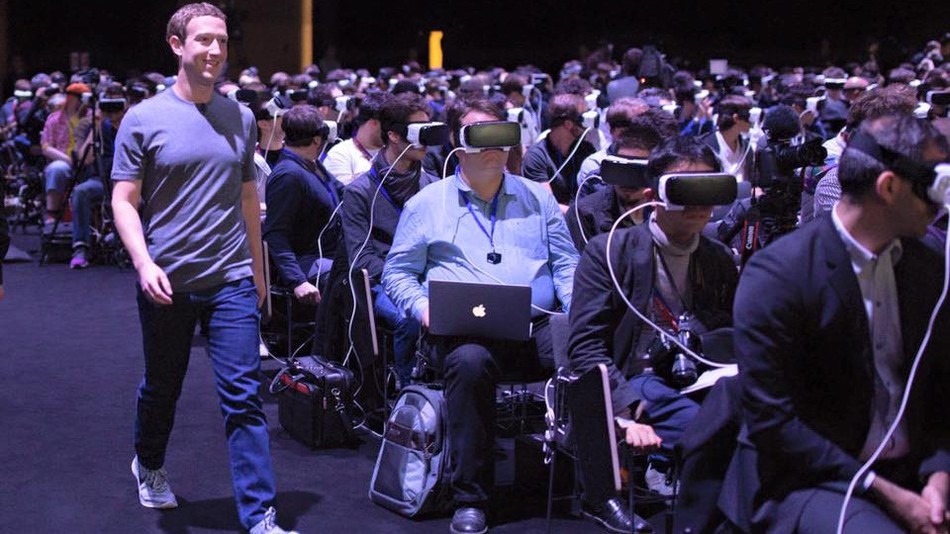 Would you trust an ad company like Facebook, or its developer partners, to access your face with their surveillance tracking?
Would you trust an ad company like Facebook, or its developer partners, to access your face with their surveillance tracking?If you have people working in your house— no matter how trusted you think they are— you still lock up your valuables. You don't wait until they're stolen and then try to find out who took them. That's just bad decision making.
It's pretty clear users should similarly be demanding that Apple rein in what access all developers have, and strictly enforce rules. Where Apple has done that, in areas like limiting access to location data, iOS users have been spared the detailed location data tracking that is rampant on Android. Facebook on Android sucked up contacts because it could. On iOS, it was limited. The correct approach for users was Apple's Walled Garden, not Google's openly permissive sludge pit.
Health and wellness
At WWDC14, Apple introduced its new privacy-minded HealthKit, foreshadowing the introduction of Apple Watch later that year. Apple has continued to expand its health tentacles since, introducing ResearchKit and CareKit as frameworks for building apps aimed at improving healthcare and clinical studies. Perhaps this year we will find out what Apple plans to do with Beddit and other health-related acquisitions it's made recently. There may also be new frameworks introduced that could point to future hardware features, from tracking blood sugar to monitoring temperature and breathing.
In addition to moving into health records, research, and care management, Apple is also pushing deeper into athletics. I expected Apple to introduce more engagement features between Apple Watch users by now, but perhaps they're still coming. A gamified way to compete with and challenge friends in a flexible way would help increase interest in Apple Watch.
By incrementally turning exercise into a game where the points are scored in feeling good and looking better, Apple can continue to increase that emotional link between buyers and its brand. Apple currently runs three health clinics and three gyms at its Northern California campus facilities. It could eye moving into further into public health partnerships, creating new retail and services business opportunities targeting health and wellness smart wearables hardware.
After having gotten into the best shape of my life after I got an Apple Watch, I can't imagine not wearing one. In fact, when I went without it for a few days during an exchange, I felt anxious about not knowing how well I was doing. Again, it's remarkable that nobody else in the industry is attracting similar interest to their own $450 wearable product.
On Monday, join us for coverage of WWDC19 in San Jose, Calif.
AppleInsider will be reporting live throughout WWDC 2019, starting with the keynote on Monday, June 3. Get every announcement as it happens by downloading the AppleInsider app for iOS, and by making sure to follow us on YouTube, Twitter @appleinsider, Facebook and Instagram.
 Daniel Eran Dilger
Daniel Eran Dilger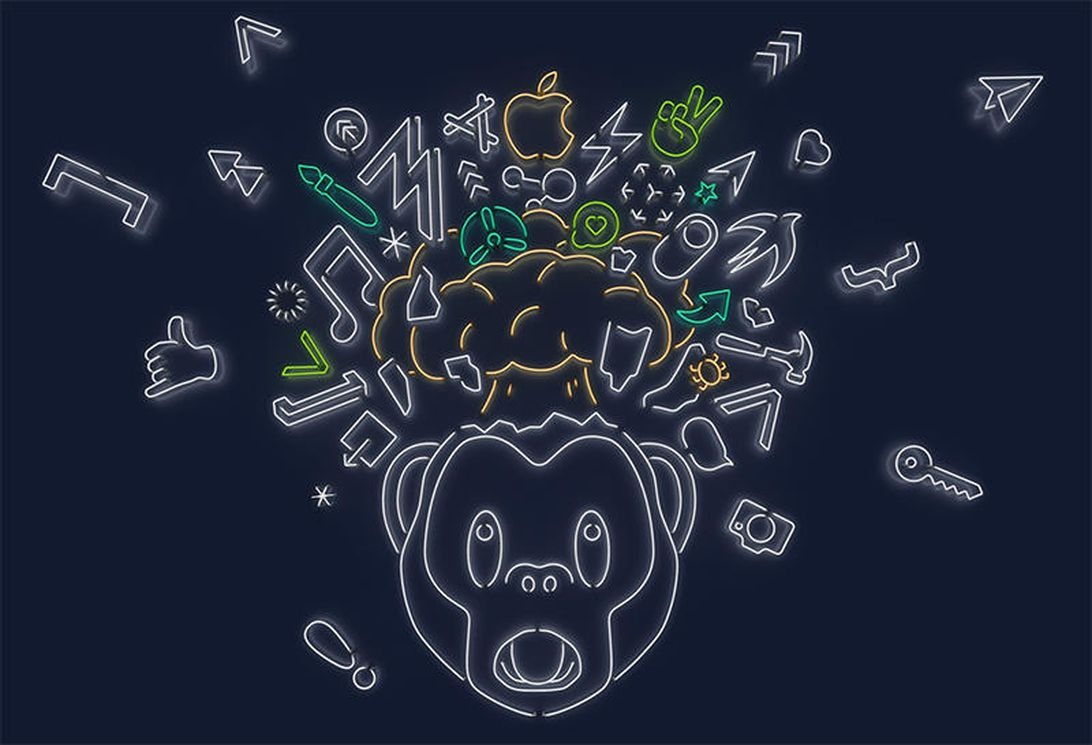
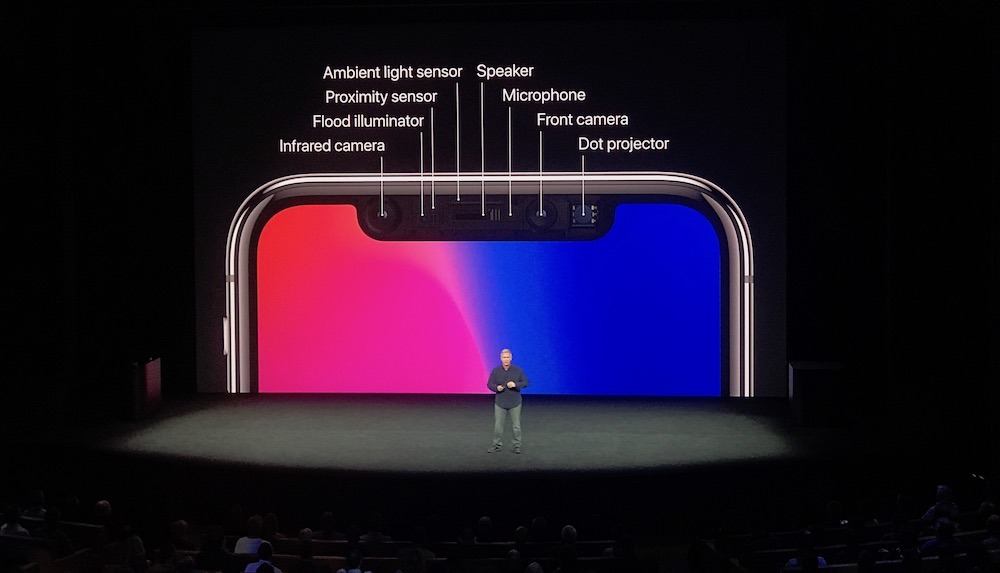
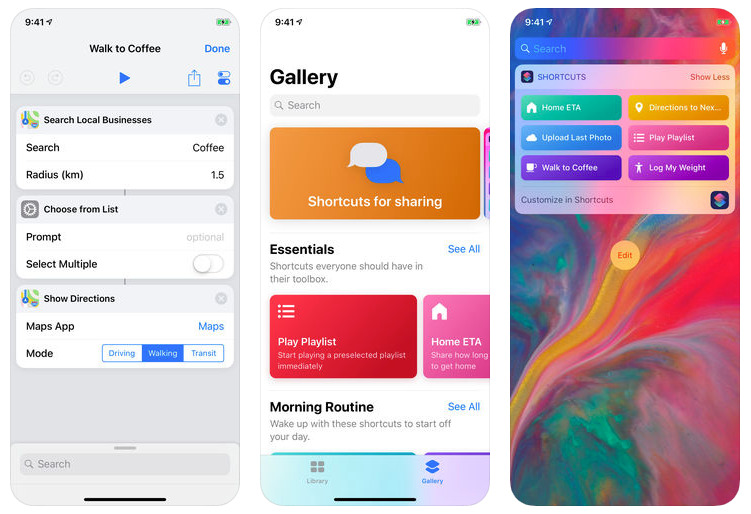
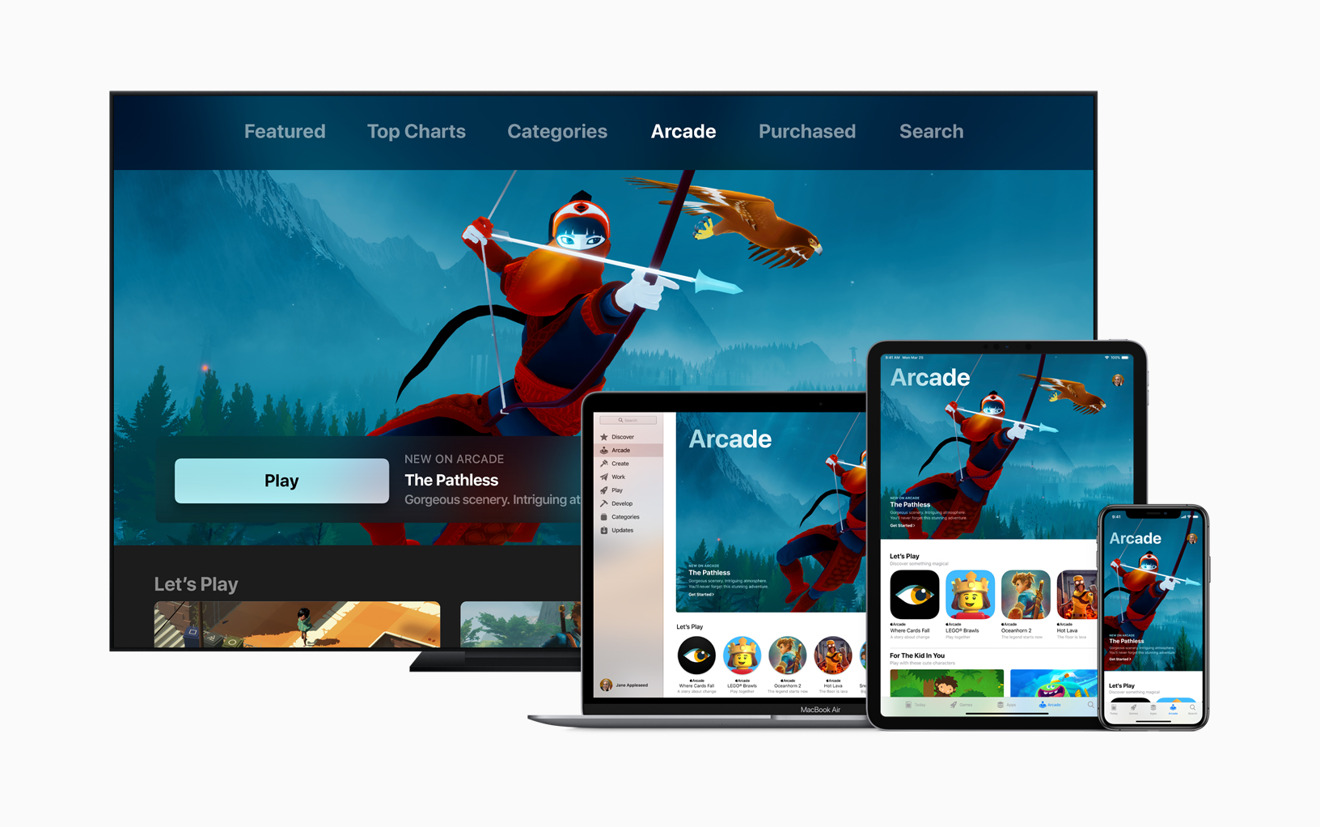







-m.jpg)






 Marko Zivkovic
Marko Zivkovic
 Christine McKee
Christine McKee
 Andrew Orr
Andrew Orr
 Andrew O'Hara
Andrew O'Hara
 William Gallagher
William Gallagher

 Mike Wuerthele
Mike Wuerthele
 Bon Adamson
Bon Adamson


-m.jpg)



27 Comments
Ho boy, this is going to make the charter members of the perpetually disappointed and underwhelmed club literally stroke out. I love the article because it completely describes my frame of mind in 1982 when I bought my first Apple product, an Apple ][+. There just wasn’t anything like it on the market. Here I am thirty-seven years later and I’m still on the bandwagon. Sometimes there were bumps and potholes on the road but Apple is still Apple.
A brilliant tome-tale. Retrospective, introspective, prospective, reflective, sans invectives. Bravo and bows to you, DED.
So many paragraphs and so little substance.
"
lol. just lol.
As usual, a great piece by DED. Articles such as this are so much more rewarding than the volumes of gibberish and speculations spewed out by stringers and pundits who really have no idea what they are talking about.